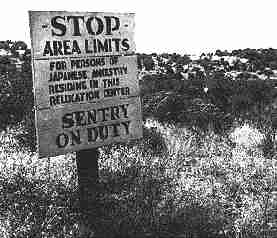In celebration of APIA Heritage Month, we’ll be running a special Poetry in History series once a week in lieu of our Friday prompts. For each post in the series, we’ll highlight an important period in Asian American history and conclude with an idea that we hope will provoke you to respond. Today’s post centers around the internment of Japanese Americans during World War II.
We’ve all seen the photographs: bleak desert landscapes, makeshift barracks, endless stretches of barbed wire fence. We’ve heard the euphemisms: “relocation,” “evacuation,” and “evacuees,” put into circulation by President Roosevelt’s Executive Order 9066 and the infamous public notices that appeared shortly afterward, stapled to telephone poles and pasted in store front windows addressed “TO ALL PERSONS OF JAPANESE ANCESTRY.” For the Japanese American, Asian American — any American, really, regardless of “ANCESTRY” — what are we to make of this moment in our nation’s history, when approximately 110,000 men, women, and children were robbed of their rights, property, and due process of the law in the name of “national security”?
In an era of liberal personhood, when most — but certainly not all, recent legislation in Arizona being a case in point — citizens of the United States enjoy relative protection under the law, how are we to respond to the egregious moment in 1942 when crowds of Japanese immigrants and their American-born children were herded onto fairgrounds, relegated to horse stalls and racetracks, and “relocated” to barbed-wire compounds and hastily constructed prison barracks throughout the nation? And all this, in response to sentiment like that expressed by columnist Henry McLemore: “I am for the immediate removal of every Japanese on the West Coast to a point deep in the interior. I don’t mean a nice part of the interior either. Herd ’em up, pack ’em off and give ’em the inside room in the badlands… Personally, I hate the Japanese. And that goes for all of them.”
Continue reading “Poetry in History: Japanese American Internment”

